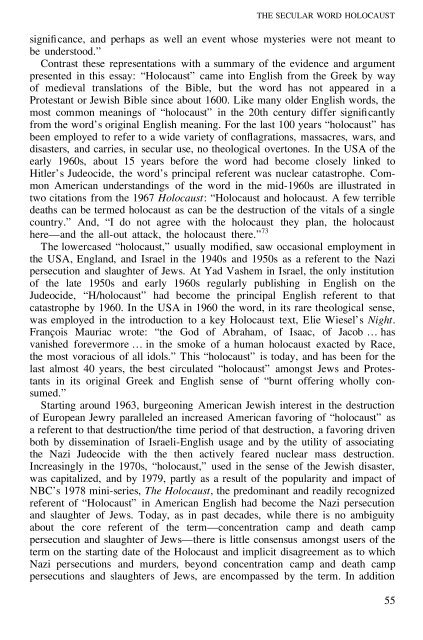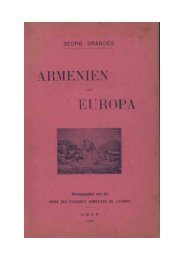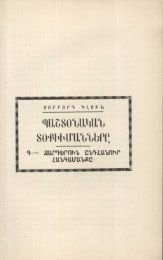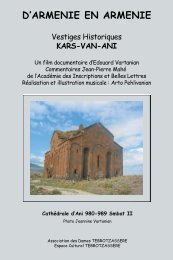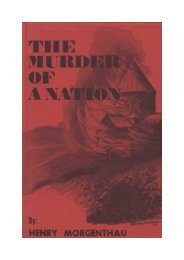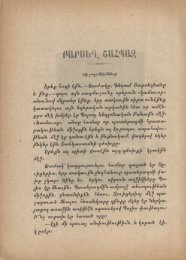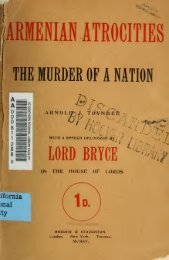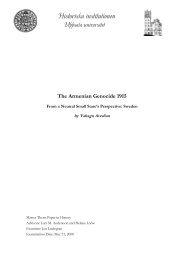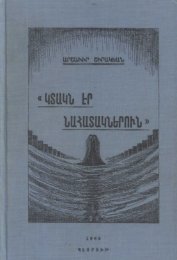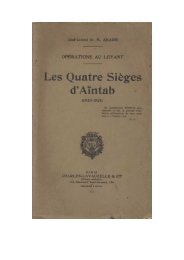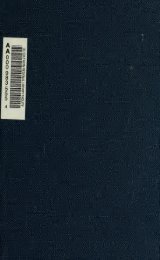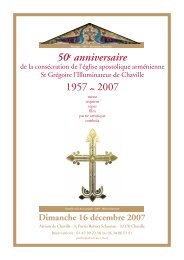The secular word HOLOCAUST: scholarly myths, history, and 20th ...
The secular word HOLOCAUST: scholarly myths, history, and 20th ...
The secular word HOLOCAUST: scholarly myths, history, and 20th ...
Create successful ePaper yourself
Turn your PDF publications into a flip-book with our unique Google optimized e-Paper software.
THE SECULAR WORD <strong>HOLOCAUST</strong>signi cance, <strong>and</strong> perhaps as well an event whose mysteries were not meant tobe understood.”Contrast these representations with a summary of the evidence <strong>and</strong> argumentpresented in this essay: “Holocaust” came into English from the Greek by wayof medieval translations of the Bible, but the <strong>word</strong> has not appeared in aProtestant or Jewish Bible since about 1600. Like many older English <strong>word</strong>s, themost common meanings of “holocaust” in the <strong>20th</strong> century differ signi cantlyfrom the <strong>word</strong>’s original English meaning. For the last 100 years “holocaust” hasbeen employed to refer to a wide variety of con agrations, massacres, wars, <strong>and</strong>disasters, <strong>and</strong> carries, in <strong>secular</strong> use, no theological overtones. In the USA of theearly 1960s, about 15 years before the <strong>word</strong> had become closely linked toHitler’s Judeocide, the <strong>word</strong>’s principal referent was nuclear catastrophe. CommonAmerican underst<strong>and</strong>ings of the <strong>word</strong> in the mid-1960s are illustrated intwo citations from the 1967 Holocaust: “Holocaust <strong>and</strong> holocaust. A few terribledeaths can be termed holocaust as can be the destruction of the vitals of a singlecountry.” And, “I do not agree with the holocaust they plan, the holocausthere—<strong>and</strong> the all-out attack, the holocaust there.” 73<strong>The</strong> lowercased “holocaust,” usually modi ed, saw occasional employment inthe USA, Engl<strong>and</strong>, <strong>and</strong> Israel in the 1940s <strong>and</strong> 1950s as a referent to the Nazipersecution <strong>and</strong> slaughter of Jews. At Yad Vashem in Israel, the only institutionof the late 1950s <strong>and</strong> early 1960s regularly publishing in English on theJudeocide, “H/holocaust” had become the principal English referent to thatcatastrophe by 1960. In the USA in 1960 the <strong>word</strong>, in its rare theological sense,was employed in the introduction to a key Holocaust text, Elie Wiesel’s Night.François Mauriac wrote: “the God of Abraham, of Isaac, of Jacob … hasvanished forevermore … in the smoke of a human holocaust exacted by Race,the most voracious of all idols.” This “holocaust” is today, <strong>and</strong> has been for thelast almost 40 years, the best circulated “holocaust” amongst Jews <strong>and</strong> Protestantsin its original Greek <strong>and</strong> English sense of “burnt offering wholly consumed.”Starting around 1963, burgeoning American Jewish interest in the destructionof European Jewry paralleled an increased American favoring of “holocaust” asa referent to that destruction/the time period of that destruction, a favoring drivenboth by dissemination of Israeli-English usage <strong>and</strong> by the utility of associatingthe Nazi Judeocide with the then actively feared nuclear mass destruction.Increasingly in the 1970s, “holocaust,” used in the sense of the Jewish disaster,was capitalized, <strong>and</strong> by 1979, partly as a result of the popularity <strong>and</strong> impact ofNBC’s 1978 mini-series, <strong>The</strong> Holocaust, the predominant <strong>and</strong> readily recognizedreferent of “Holocaust” in American English had become the Nazi persecution<strong>and</strong> slaughter of Jews. Today, as in past decades, while there is no ambiguityabout the core referent of the term—concentration camp <strong>and</strong> death camppersecution <strong>and</strong> slaughter of Jews—there is little consensus amongst users of theterm on the starting date of the Holocaust <strong>and</strong> implicit disagreement as to whichNazi persecutions <strong>and</strong> murders, beyond concentration camp <strong>and</strong> death camppersecutions <strong>and</strong> slaughters of Jews, are encompassed by the term. In addition55


